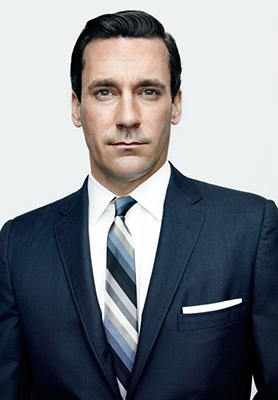Like Don Draper, Barack Obama Can Never Go Home
Jack Cashill's newest book is out:
Get your copy of Jack Cashill's "You Lie!"

___
Also:
Jack Cashill's:
Hoodwinked: How Intellectual Hucksters have Hijacked American Culture

Click here for signed first edition
©Jack Cashill
AmericanThinker.com - May 25, 2015
 In watching the seventh season of AMC’s inspired hit series Mad Men unfold, I found myself thinking of the Obama presidency, also in its seventh season. (No spoilers until article’s end).
In watching the seventh season of AMC’s inspired hit series Mad Men unfold, I found myself thinking of the Obama presidency, also in its seventh season. (No spoilers until article’s end).
For those who may not have seen the series, the principal character of Mad Men is a sophisticated and self-possessed creative director for a New York ad agency named Don Draper. In many ways, Draper fits the mold of the American Adam, a highly competent individualist with no fixed past and no set future. This archetype has been a staple of American expression from Cooper’s Natty Bumpo to Fitzgerald’s Jay Gatsby to just about every character Clint Eastwood has ever played, some of whom don’t even have a name, let alone a history.
Like Gatsby—and, more to the point, like Barack Obama—Draper has invented himself. Viewers learn early in the first season that he is not really who he says he is. He went to Korea as a no-account private from a brutally dysfunctional home and assumed the identity of his lieutenant after a fatal accident that he himself caused. Although usually confident and self-contained, ad exec Draper lives in terror that he will be exposed.
At this stage in his presidency, Barack Obama no longer lives in terror. The fact that he reportedly spent $2 million or so on attorney fees to keep his birth certificate sealed suggests that he once did. I am still not certain what it was that he needed to conceal. As to Obama’s grades and test scores, Jimmy Hoffa’s body will be unearthed before those are.
If Draper’s self-inventions make him more interesting, Obama’s make him more frightening. We don’t expect illusion from our presidents. Historically, we have preferred their life stories to be non-fictional.
Obama’s fictionalizing began early. When he returned to Hawaii from Indonesia as a ten-year old, he struggled to define who he was. Given what his mother told him about Americans, he could have hardly wanted to be one. As to being an African American, all he knew is what he saw on TV. And so he told his new schoolmates that his father was a prince and his grandfather a chief of a great African tribe.
The story worked on his classmates and almost on himself. “But another part of me knew that what I was telling them was a lie,” he writes, “something I’d constructed from the scraps of information I’d picked up from my mother.” For the next forty years, Obama would continue constructing identities for himself: high school stoner, college Marxist, New York intellectual, Chicago Alinskyite, Harvard cosmopolitan, African American ward heeler, All-American presidential candidate.
By the time of his 1995 memoir, Dreams from My Father, Obama had picked up enough postmodern patois to rationalize these identity shifts and the lies needed to ease the transitions. Like pornography, postmodernism is hard to define, but easy to spot. In Dreams, Obama showed all the symptoms. He acknowledged spending much of his life “plugging up holes in the narrative”—one of the many references to “narratives,” “fictions,” “poses,” and “grooves” that comprise the “stitched together” nature of his life. The result is a biography that cannot be trusted.
Even a supportive Obama biographer like David Remnick called Dreams a "mixture of verifiable fact, recollection, recreation, invention, and artful shaping." Equally friendly biographer David Maraniss agreed. “The character creations and rearrangements of the book are not merely a matter of style, devices of compression, but are also substantive,” wrote Maraniss, four years after his dishonest 2008 bio piece in the Washington Post helped Obama get elected.
"We didn't understand why his politically calculating chameleon nature was never discussed," an aide to Hillary Clinton told Remnick. "We were said to be the chameleons, but he changed his life depending on who he was talking to."
Obama proved such a successful fabulator only because influential white liberals like Remnick and Maraniss enabled him. He had the good fortune of growing up thinking and acting much as they had but in the body of a black man. He believed what they believed and spoke as they spoke. They noticed, they approved, they marveled.
“I mean, you got the first mainstream African-American presidential candidate who is articulate and bright and clean and a nice-looking guy,” said Joe Biden of Obama in early 2007. Not to be out-gaffed, Senate majority Leader Harry Reid found comfort in Obama’s having “no Negro dialect.”
 SPOILER ALERT: At the end of the seventh and final season, the ever-elusive Draper abandons his agency and undertakes a cross-country quest to come to terms with who he really is. In Dreams, of course, Obama does much the same. The difference is that Draper’s odyssey, though, fictional, is more emotionally credible than Obama’s allegedly real search for his father and his African roots.
SPOILER ALERT: At the end of the seventh and final season, the ever-elusive Draper abandons his agency and undertakes a cross-country quest to come to terms with who he really is. In Dreams, of course, Obama does much the same. The difference is that Draper’s odyssey, though, fictional, is more emotionally credible than Obama’s allegedly real search for his father and his African roots.
In a recent interview, Obama’s African half brother, Malik, the best man at Obama’s wedding, lamented that the he and his relatives were essentially used as props in Obama’s “unusual story,” one that “contributed greatly to what he is right now.”
Said Malik, “I don’t understand how somebody who claims to be a relative or a brother can behave the way that he’s behaving, be so cold and ruthless, and just turn his back on the people he said were his family.”
In one of the earlier seasons, Draper too turned his back on a brother, and the brother responded by killing himself. Having abandoned his only relative and divorced two wives, Draper has no home to go home to. The final scenes show him coming to terms with the lie he has made  out of his life at a therapeutic center much like Esalen in Big Sur. Emotionally, the ending disappoints. For all Draper’s flaws, viewers take to the character because of his steely bravado (left). They do not enjoy seeing him turn weak and weepy.
out of his life at a therapeutic center much like Esalen in Big Sur. Emotionally, the ending disappoints. For all Draper’s flaws, viewers take to the character because of his steely bravado (left). They do not enjoy seeing him turn weak and weepy.
Thematically, however, the ending works beautifully. At Esalen, Draper sheds one skin presumably to assume another. The final scene shows him chanting mindlessly (below) with his new age buddies then cuts to the classic, 70s-era Coca Cola ad in which scores of multicultural, new age types sing about Coke, “the real thing.” His agency colleagues had earlier tempted him to return with the Coca Cola account. Viewers assume that a freshly reinvented Don Draper took up his craft once more and applied his newfound consciousness to help teach the world how to sing.

Although as unmoored as Draper, it is unlikely that Obama will even try to come to terms with the lies of his own life. What matters most to him, now as always, is that he be seen striking the right pose, finding the right groove, spinning the right narrative. He is not a serious man, never was. Expect his post-presidential memoirs to be every bit as fictional as his earlier ones.
Editor's note: Jack Cashill, newest book, You Lie: The Evasions, Omissions, Fabrications, Frauds and Outright Falsehoods of Barack Obama will be available October 7.

